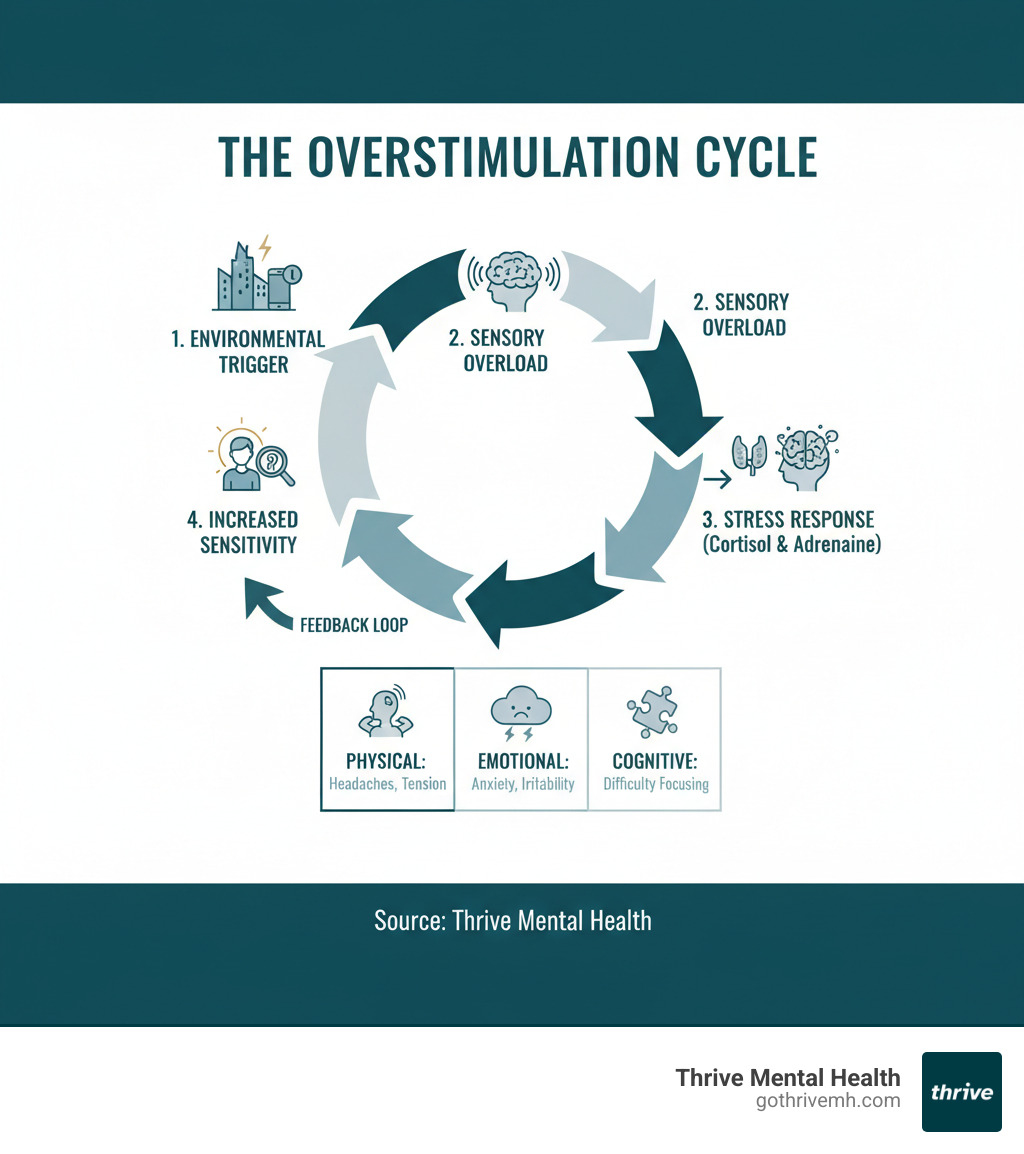How to Manage Overstimulation in 5 Easy-to-Follow Steps

Here’s Why You’re Feeling Overstimulated: 5 Relief Steps
Why Modern Life Leaves You Feeling Overstimulated
Your senses are maxed out. The notifications won’t stop. Your to-do list keeps growing. And somewhere between the fourth Zoom call and the ping of another text, your brain just…shuts down.
You’re not alone. A staggering 82% of Americans have felt overstimulated at some point, and many experience it daily. That buzzing, on-edge feeling isn’t weakness—it’s your nervous system begging for a break.
Quick Answer: Why You Feel Overstimulated and What to Do
| Why It Happens | What to Do Right Now |
|---|---|
| Your brain receives more sensory input than it can process | Use the 5-4-3-2-1 grounding technique |
| Stress hormones (cortisol, adrenaline) flood your system | Practice box breathing (4 counts in, 4 hold, 4 out) |
| Technology, noise, crowds, and chronic stress overload your senses | Remove yourself from the situation temporarily |
| Your sympathetic nervous system stays in “fight-or-flight” mode | Create a quiet, low-stimulus space |
| Lack of sleep and constant demands drain your resilience | Set digital boundaries and limit screen time |
This isn’t about being “too sensitive.” Modern life genuinely overwhelms our nervous systems with endless screen time, work demands, and the constant hum of urban environments. The good news? You can reset your nervous system and reclaim your calm. This guide gives you five concrete steps to manage overstimulation, from immediate relief to long-term prevention.
As Anna Green, LMHC, LPC, founder of Thrive Mental Health, I’ve spent my career helping people manage sensory overload with evidence-based practices like CBT, EMDR, and sensory integration approaches. My goal is to give you tools that actually work when your nervous system is maxed out.

What is Overstimulation and How Does It Affect Your Brain?
Think of your brain like a computer with too many programs running—eventually, it freezes. That’s overstimulation. Also called sensory overload, it occurs when your five senses take in more information than your brain can process. Your nervous system has a literal processing limit, and modern life constantly pushes us past it.
When you hit that limit, your sympathetic nervous system flips into “fight-or-flight” mode. This ancient survival mechanism floods your system with stress hormones like cortisol and adrenaline. Your heart rate speeds up, your blood pressure rises, and you feel wired and on edge—even though there’s no actual danger. When this response is triggered repeatedly, it takes a serious toll on your body and mind, affecting everything from sleep to immunity. The effects of stress on the body are well-documented. Once your nervous system is stuck in this heightened state, even small stimuli can feel overwhelming, creating a cycle that’s hard to break.

Common Causes and Triggers
In our hyper-connected world, triggers are everywhere. Technology is a primary cause, with phones generating hundreds of micro-interruptions daily. Social media feeds, designed to keep you scrolling, constantly feed your brain new information. Other major triggers include:
- Loud noises: Traffic, open-office chatter, and loud music force your auditory system into overdrive.
- Crowded spaces: Malls, concerts, and busy restaurants bombard multiple senses at once.
- Blurred work-life balance: Remote work can erase the line between your office and your sanctuary, preventing your brain from decompressing.
- Chronic stress & lack of sleep: Financial pressure, relationship issues, and poor sleep dramatically reduce your brain’s capacity to handle stimuli, leaving you vulnerable to overload.
- Social demands: Constant interaction and the pressure to be “on” can drain your mental resources.
Recognizing these triggers is the first step. Once you identify what’s pushing you past your limit, you can make strategic changes. For additional support, explore Online Therapy for Stress options custom to your needs.
Recognizing the Signs: Are You Chronically Overstimulated?
Your body sends clear warning signals when it’s had enough. Overstimulation can masquerade as a “bad day,” but when these symptoms become your new normal, it’s time to pay attention.
Emotional Symptoms:
- Irritability: Snapping at others over minor issues.
- Anxiety: A persistent sense of unease or dread.
- Restlessness: Feeling “wired but exhausted,” unable to settle down.
- Feeling on edge: A constant sense that something bad is about to happen.
- Desire to escape: An intense urge to find a quiet, dark space.
Physical Symptoms:
- Headaches and muscle tension: Frequent tension headaches and tight muscles in the neck, shoulders, and jaw.
- Fatigue: Waking up feeling drained despite a full night’s sleep.
- Dizziness or lightheadedness: A sense of being off-balance.
- Anxiety shakes: Uncontrollable trembling in your hands or legs.
- Racing heart and digestive issues: A pounding heart or stomach problems with no clear cause.
- Hypersensitivity: Lights seem too bright, sounds too loud, and textures unbearable.
Cognitive Symptoms:
- Brain fog: Feeling hazy and unclear.
- Difficulty concentrating: Inability to focus on even simple tasks.
- Racing thoughts: A cluttered mind that won’t quiet down.
- Indecisiveness: Simple decisions feel overwhelming.

If you recognize these signs, your nervous system is waving a red flag. These are legitimate physiological responses to overload. Recognizing them is the first step toward relief.
The Link Between Overstimulation, Anxiety, and Neurodivergence
While anyone can feel overstimulated, it’s more common for those with certain mental health conditions or neurodivergent profiles due to differences in how their brains process information and stress.
- Anxiety Disorders: If you have an anxiety disorder, your nervous system is already hypervigilant. As clinical psychologist Dr. Nicolle Pacifico notes, anxiety can make thoughts “bounce back and forth,” making even minor sensory input feel overwhelming. Understanding anxiety symptoms and their impact on daily life is key.
- ADHD: Individuals with ADHD often struggle to filter out irrelevant sensory information. Busy environments like open offices or malls can be particularly challenging, leading to restlessness, irritability, and anxiety.
- Autism Spectrum Disorder (ASD): Many people on the autism spectrum have sensory processing differences. Loud noises, bright lights, or specific textures that are mildly annoying to a neurotypical person can be genuinely painful, quickly overwhelming their nervous system.
- Post-Traumatic Stress Disorder (PTSD): Sensory cues that remind someone of their trauma (a smell, a sound) can be incredibly triggering, creating a state of hypervigilance and hyperarousal. This keeps the nervous system on constant high alert, making them highly susceptible to overstimulation.
These differences aren’t a character flaw; they’re a signal that the brain is wired differently and requires specific strategies for support and self-care.
Here’s Why You’re Feeling Overstimulated — And What to Do About It: A 5-Step Action Plan
The good news is that managing overstimulation is entirely possible. It involves a combination of immediate coping skills and long-term preventative strategies. Here’s our five-step action plan to help you regain your calm and build resilience.
Step 1: Immediate Relief — How to Calm Down in the Moment
When you feel the familiar surge of overstimulation, interrupt the stress response with these quick techniques:
- Use the 5-4-3-2-1 Method: Ground yourself by identifying 5 things you see, 4 you hear, 3 you can touch, 2 you can smell, and 1 you can taste.
- Practice Deep Breathing: Use box breathing (inhale 4, hold 4, exhale 4, hold 4) to slow your heart rate and signal safety to your brain.
- Remove Yourself: Step into a quieter room or go outside for a few minutes. A brief change of scenery can make a huge difference.
- Take a Short Break: Close your eyes for a few minutes or listen to calming music to break the momentum.
- Change Your Temperature: Splash cold water on your face or hold a cold compress to your neck to stimulate the vagus nerve. Engaging in Somatic exercises for mental health can also help.
Step 2: Proactive Prevention — Build Resilience with Daily Habits
Long-term management requires building habits that strengthen your resilience:
- Prioritize Sleep: Aim for 7-9 hours of quality sleep to help your brain process information and reset.
- Eat a Balanced Diet: Nourishing foods support brain health and stabilize mood and energy.
- Exercise Regularly: Physical activity is a natural stress reliever that can dissipate tension.
- Practice Mindfulness: Meditation and mindfulness train your attention, helping you notice and respond to overstimulation early.
- Journal: Writing down your thoughts can reduce the mental “noise” that contributes to overload.
- Schedule Self-Care: Regularly engage in activities that replenish your energy. Building long-term resilience is a marathon, not a sprint.
Step 3: Environmental Control — Create Your Sanctuary
Taking control of your surroundings can drastically reduce daily sensory input.
- Create a Safe Space: Designate a quiet, trigger-free area in your home where you can decompress.
- Adjust Lighting: Use soft, warm lighting or dimmers to avoid harsh, overstimulating lights.
- Use Noise-Canceling Headphones: A game-changer for noisy environments, commutes, or when you need quiet.
- Reduce Clutter: A tidy, minimalist space promotes a sense of calm and reduces mental distraction.
- Try Ambient Sound: Calming ambient music or a white noise machine can create a soothing auditory backdrop.
- Engage in Therapeutic Art Activities: Creative expression in a controlled environment can help process overwhelming feelings.
Step 4: Set Boundaries — Reclaim Your Time and Energy
Overstimulation often stems from a lack of boundaries. Protecting your time and energy is a powerful act of self-care.
- Digital Boundaries: Mute non-essential notifications, set time limits for social media, and designate “offline” times, like during meals or before bed.
- Social Boundaries: It’s okay to say “no” to invitations that you know will be draining. Communicate your needs clearly, letting friends and family know when you need quiet time to recharge. Schedule dedicated alone time to process and recover.
Step 5: When to Seek Professional Support
If self-help strategies aren’t enough, or if overstimulation is persistently disrupting your life, professional support is essential. Consider seeking help if:
- Your symptoms are chronic and don’t improve with self-management.
- Overstimulation significantly interferes with your work, relationships, or quality of life.
- You suspect it’s linked to a condition like anxiety, ADHD, ASD, or PTSD. Understanding the Impact of Mental Disorders on Daily Life can help you decide.
Mental health professionals can offer custom support, including:
- Cognitive Behavioral Therapy (CBT): Helps you identify and reframe negative thought patterns.
- Sensory Integration Therapy: Helps you better process and respond to sensory input.
- Other Modalities: Depending on your needs, therapies like ACT or EMDR might be beneficial.
Seeking help is a sign of strength. The benefits of mental health therapy extend far beyond managing symptoms, helping you build lasting coping skills.
Accessing Care: Insurance and Local Options
Figuring out insurance and care options can be stressful. At Thrive Mental Health, we streamline the process. We’re in-network with major insurance carriers, including Cigna, Optum, and Florida Blue, making care more affordable. If you’re out-of-network, we’ll help you maximize your benefits.
We offer virtual and hybrid intensive outpatient (IOP) and partial hospitalization (PHP) programs with evening options, so you can get expert-led care without rearranging your life. Our virtual programs are especially helpful if you find in-person settings overstimulating, allowing you to receive therapy from the comfort of your own safe space.
Whether you’re in Florida—from Miami and Fort Lauderdale to Orlando, Tampa, or Jacksonville—our virtual programs make high-quality care accessible statewide. We design our programs to fit your life, not the other way around.
For a detailed walkthrough, check out our Virtual mental health counseling guide. You can verify your insurance coverage in about two minutes with no obligation—just clear answers about your costs.
Frequently Asked Questions about Overstimulation
{
"@context": "https://schema.org",
"@type": "FAQPage",
"mainEntity": [{
"@type": "Question",
"name": "What's the difference between being overstimulated and overwhelmed?",
"acceptedAnswer": {
"@type": "Answer",
"text": "Overstimulation is a sensory issue, where your five senses are taking in more input than your brain can process. Being overwhelmed is typically an emotional or mental state caused by too many tasks, responsibilities, or thoughts. While they often happen together, overstimulation is about sensory input, whereas being overwhelmed is about emotional and cognitive load."
}
},{
"@type": "Question",
"name": "Can overstimulation cause physical symptoms like headaches or fatigue?",
"acceptedAnswer": {
"@type": "Answer",
"text": "Yes, absolutely. Overstimulation triggers the body's 'fight-or-flight' stress response, releasing hormones like cortisol and adrenaline. This can lead to physical symptoms such as headaches, muscle tension, fatigue, dizziness, a racing heart, and stomachaches as your body remains in a state of high alert."
}
},{
"@type": "Question",
"name": "How can I help a friend who is overstimulated?",
"acceptedAnswer": {
"@type": "Answer",
"text": "The best way to help is to ask what they need. You can suggest moving to a quieter, less crowded space. Speak in a calm, quiet voice and avoid asking too many questions. Reducing sensory input—like dimming lights or turning off music—can be very helpful. The key is to offer support without adding more stimulation to the situation."
}
}]
}
Find Your Calm with Professional Support
Feeling overstimulated doesn’t have to be your default. Modern life can overwhelm our nervous systems, but you have the power to fight back. Using grounding techniques, building resilient habits, controlling your environment, and setting boundaries are acts of self-preservation in a demanding world.
However, sometimes self-help isn’t enough. If overstimulation persistently disrupts your life or you suspect it’s linked to anxiety, ADHD, or PTSD, professional guidance can make all the difference. Reaching out is a sign of strength.
At Thrive Mental Health, our flexible remote mental health support programs are designed to fit your life, with services available throughout Florida. Our virtual and hybrid intensive outpatient (IOP) and partial hospitalization (PHP) programs offer evening options, so you can get expert-led care without adding more stress. We work with major insurance providers like Cigna, Optum, and Florida Blue.
Ready for support? Thrive offers virtual and hybrid IOP/PHP with evening options. Verify your insurance in 2 minutes (no obligation) → Start benefits check or call 561-203-6085. If you’re in crisis, call/text 988.
